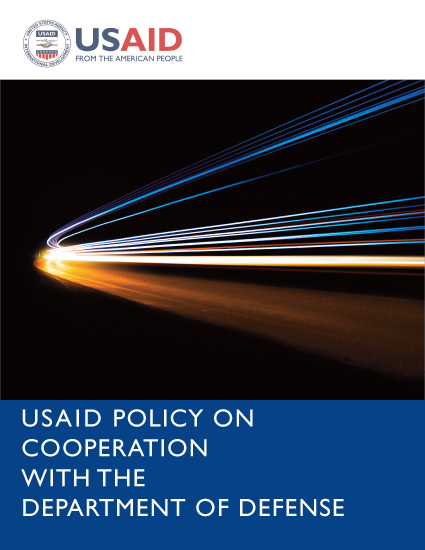Speeches Shim
This policy updates the Civilian-Military Cooperation Policy issued in July 2008,which established the foundation for cooperation between the United States Agency for International Development (USAID) and the United States Department of Defense (DoD). The 2008 policy established civilian-military cooperation as fundamental to a whole-of-government approach to contemporary national security challenges in keeping with the increasingly important role of development in advancing national security priorities along with defense and diplomacy.1
This document builds upon the 2008 policy and incorporates what USAID has learned from working with DoD into updated and expanded guidance for all USAID personnel. Increasingly,USAID and DoD share the same operating space. In order to cooperate effectively in the diverse places where USAID and DoD personnel find each other, it is important to draw upon lessons from experiences in Iraq and Afghanistan and from cooperation in other countries and regions where we have worked together, including Colombia, the Philippines, the Balkans, and the Sahel.
This policy document articulates a set of guiding principles to establish parameters for USAID cooperation with DoD and clarifies the context for that cooperation. These are followed by a set of operating principles,which articulate how that cooperation takes place in the form of cooperative structures and personnel exchanges and across USAID’s Program Cycle, which includes policy and strategy development, planning, project design and implementation, evaluation and monitoring, and learning and adapting.2
Implementation Guidance will be issued in stages following publication of this policy to provide practical guidance for USAID personnel to apply the policy where USAID and DoD have linkages in various sectors and issue areas. This new guidance will replace the Civilian-Military Implementation Guidelines issued with the 2008 policy.
1 The role of development in support of our national security priorities has grown in importance since the 2002 National Security Strategy (NSS). The 2010 NSS asserts that development is a “strategic, economic, and moral imperative,” and that with diplomacy, development can “help prevent conflict, spur economic growth, strengthen weak and failing states, lift people out of poverty, combat climate change and epidemic disease, and strengthen institutions of democratic government.”This was echoed in the recently released 2015 NSS, which names development, along with diplomacy, as our first line of action in defense and promotion of America’s interests.
2 The “Program Cycle” is USAID’s framework for describing a common set of processes intended to achieve more effective development interventions and maximize impacts. For more information and resources on the Program Cycle, see the USAID Learning Lab at http://usaidlearninglab.org/library/usaid-program-cycle-101.


Comment
Make a general inquiry or suggest an improvement.